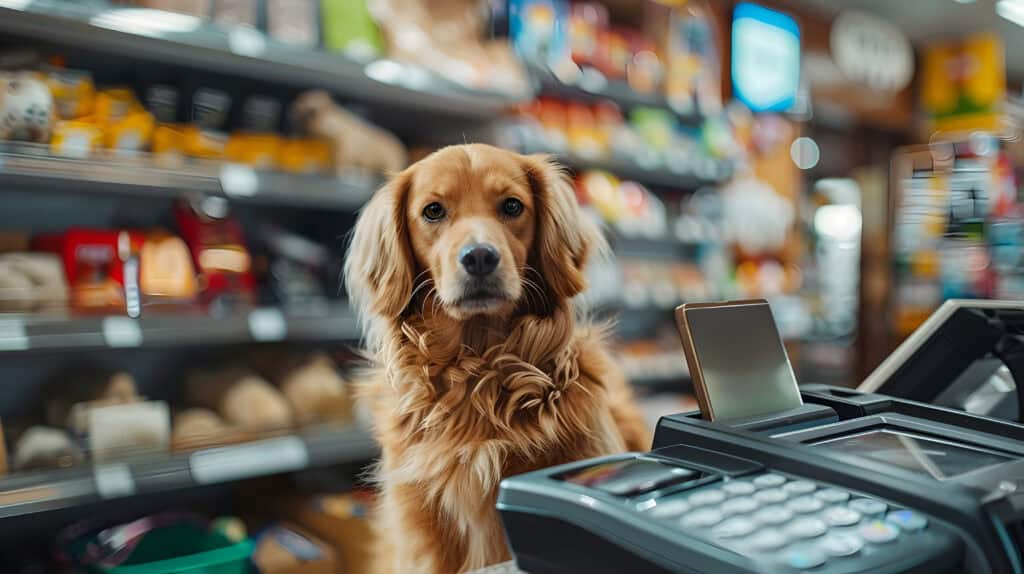
By alphacardprocess October 1, 2025
Sustainability is now a driving factor in consumer behavior with more consumers actively seeking out businesses that share their environmental values. The pet retail business, while thriving, is increasingly on the hook for its environmental toll, stretching from packaging waste and supply chain emissions to energy usage in stores. As a result, retailers are being challenged to explore innovative ways to operate more responsibly.
Payment is one place that is often overlooked in this debate. How transactions are handled — in-store or online — can have a significant impact on reducing waste and encouraging greener practices. From digital receipts to paperless billing, the adoption of eco-friendly payment practices allows pet retailers to minimize unnecessary resource consumption while offering convenience to their customers. The payment processor selected and the technology platforms on which merchants operate can even affect overall sustainability efforts.
In today’s marketplace, showing a commitment to sustainability is a strong point of differentiation that enables business owners to not only stand out, but also contribute to the health and well-being of the planet.
Understanding Eco-Friendly Payment Practices

Eco-friendly payment practices refer to payment approaches that reduces the environmental impact and at the same time is more efficient and/or convenient. And for retail — especially pet retail — it’s a plan that involves rethinking how traditional processes have leveraged paper, plastic and resource-intensive infrastructure.
One of the most common examples is substituting printed receipts for e-receipts that are emailed to customers or saved in a mobile wallet. This not only cuts down on paper waste, but simplifies accounting for both sellers and buyers. Likewise, contactless and mobile payments reduce the need for physical card swipes and plastic cards thus reducing dependence on non-biodegradable matter.
Eco-friendly practices can help to save on unnecessary trips, saving fuel while at the same time giving customers added convenience. By adopting these practices, pet retailers align everyday business operations with larger sustainability goals. Reducing waste, cutting resource consumption, and embracing digital-first payments demonstrate that a retailer is forward-thinking and environmentally responsible. Ultimately, these practices allow businesses to deliver modern convenience while contributing positively to the planet.
By doing so, pet retailers incorporate a commitment to sustainability as part of the everyday course of business. Recycling waste, decreasing resource use and working with digital-first payments makes the retailer as forward-thinking and environmentally friendly. Ultimately, when businesses adopt these measures, they can ensure modern convenience while contributing positively to the planet.
Why Sustainable Payment Practices Matter in Pet Retail?
Pet retail has its own environmental footprint. Traditional payment systems create surprising amounts of waste from paper receipts that fill landfills, to plastic cards and mailed invoices that consume resources. For businesses already scrutinized for its packaging and supply chain effects, payments is an area where this can often fall through the cracks.

Yet consumer behavior is changing at light speed. An increasing number of shoppers, especially pet owners, actively look for businesses they believe share their values. By adopting eco-friendly payment practices, retailers can show that they are committed to sustainability not just in products but in operations. This helps to build trust and credibility as pet owners frequently associate sustainability with caring for their pets and consequently the planet.
For independent retailers and local chains, eco-friendly payments also provide a competitive advantage. Competing with national chains can be tough, but by positioning as a sustainable alternative, smaller retailers can attract and retain eco-conscious customers in their communities.
Eco-friendly payments are also a competitive edge for independent retailers and local chains. Leveraging eco-benefits enables smaller retailers to attract and retain eco-conscious customers in their area.
In short, payment practices are no longer necessarily transactional. They’re strategic touch points that communicate a retailer’s values, improve the customer experience and differentiate businesses in an overcrowded market.
Digital Transformation and Payments
Digital transformation of payments is one of the most compelling driver for sustainability across all parts of retail, and pet retail is no different. New technologies make a more convenient customer experience, as well as cut down on impact to the environment.
Contactless and mobile wallets are great examples. Pet retailers can reduce usage of plastic payment cards and receipt paper by giving customers the ability to pay through a smartphone or wearable device with just the touch of a finger. At the same time, these quick, clean methods are in sync with consumer desires for efficiency and hygiene.
Finally, subscription services—such as auto-ship pet food or recurring delivery of essentials—use digital recurring billing to reduce resource use. Customers get a smooth experience and retailers secure returning sales without creating waste due to manual billing.
Hence, pet retailers adopting digital transformation can combine efficiency, sustainability and customer experience into a future payment ecosystem.
Green Partnerships with Payment Processors
As pet retailers aim to be more sustainable, the payment processor you choose is key for eco-friendly payment practices. More than simply facilitating payments, today’s processors are capable of actively contributing to sustainable operations and helping businesses do their part in protecting the environment.
Progressive processors today are putting a premium on carbon-neutral operations, mitigating the emissions produced by data centers, networks and infrastructure. Pet store owners can help to reduce the carbon footprint with all transactions when selecting such partners.
Another great attribute is the paperless onboarding, statements, and reporting. And eco-conscious processors don’t send monthly paper statements or require applications on paper; everything can be done digitally. A few also include sustainability reporting tools to help retailers measure how their payment practices reduce waste on paper or carbon emissions.
A number of eco-friendly fintech firms are at the forefront of this change by investing in renewable energy, green data centers and digital-first services. Their partnerships with retailers highlight a shared commitment to responsible business practices.
For pet store owners, collaborating with green fintech partners, it is more than mere cost savings. It’s part of their overall effort for greater sustainability, and a way to build a positive image in front of customers, who demand more transparency and eco-conscious practices.
Selecting the right payment processor allows pet merchants to push these sustainable practices further into their business model over time.
Customer Education and Engagement
Having eco-friendly payment practices is only half of it; find ways to educate and involve customers in the process will secure greater success in the long term. Many consumers may not immediately realize the environmental benefits of digital-first payments, so clear communication is essential.

Retailers might begin by communicating the advantages of digital receipts. By positioning such methods as safer (little risk of loss), faster (immediate delivery), and greener (no paper waste) you can encourage customers to perceive them as convenient. The staff should be trained to explain these benefits at checkout.
Adoption can also be driven through loyalty programs. For instance, customers who are dedicated to using digital receipts or mobile wallets may receive bonus points or discounts. This encourages sustainable conduct and increases the chance of a repeat business.
Marketing plays a vital role as well. Merchants can include green payment messages in store signs, online and via social media. When you frame payment sustainability as part of the store’s larger environmental mission, say, reducing packaging waste or offering green pet products, it also helps communicate a common cause to its eco-conscious customer base.
Engaging customers directly by sharing measurable results (e.g., “Our store saved 10,000 sheets of receipt paper last year by going digital”) can further enhance buy-in. This transparency fosters trust and demonstrates that even small acts can have a great impact.
In the end, when you educate and reward customers for sustainably paying in-depth and co-operation results as payment habits turn into a joint effort, bolstering loyalty through retail brand recycling.
Financial and Operational Benefits for Retailers
Implementing environmentally friendly payment behaviors are more than just good for the planet — they offer measurable financial and operational benefits to pet retailers. By shifting themselves from traditional payment flows, businesses can achieve significant cost and efficiency improvements.

Among the most immediate savings comes from eliminating paper receipts, ink and mailing costs. The costs of receipt rolls, ink cartridges and printer maintenance can add up quickly for outlets that process hundreds or even thousands of transactions every week. Digital receipts and e-billing save these costs and also minimize equipment wear and waste disposal expenses.
Another major benefit lies in efficiency gains through digital invoicing and automated billing. Rather than using manual paper-based methods or mailed-in checks, retailers can electronically manage accounts receivable and regularly schedule payments via a cloud-based service. This lowers the staff workload, cuts down on errors, and accelerates cash flow — all while offering a better customer experience.
Eco-friendly payment practices also enhance financial reconciliation. Cloud-based platforms integrate sales, inventory, and payments into a single ecosystem, making it easier to track performance and generate reports. This allows retailers to make quicker, data-driven decisions while saving time on end-of-day and monthly reconciliations.
Conclusion
The shift toward eco-friendly payment practices is reshaping the pet retail industry. From digital receipts and paperless billing to carbon-neutral partnerships with payment processors, sustainable payments provide a clear path for retailers to reduce waste and lower their environmental footprint. At the same time, they offer financial and operational benefits, including cost savings, improved efficiency, and stronger customer trust.
Ultimately, sustainable payment systems represent more than a trend—they are the future of retail. For pet retailers, adopting these solutions is both a way to make a positive environmental impact and a smart business move that ensures long-term resilience.
FAQs
1. What are the easiest eco-friendly payment practices for small pet retailers to adopt?
Small businesses can start eco-friendly payment practices with simple changes like offering digital receipts, switching to email or SMS billing, and promoting contactless payments. These practices require minimal investment and can be implemented quickly.
2. Do customers actually care about digital receipts and sustainable payment options?
Yes. Many consumers, especially younger pet owners, actively prefer digital options because they’re faster, more convenient, and environmentally friendly. Highlighting sustainability in payment practices can strengthen brand loyalty and customer trust.
3. How can pet retailers ensure compliance and data security with digital payments?
Retailers must follow PCI DSS standards and use secure, encrypted payment systems. Choosing trusted providers ensures digital receipts and paperless billing comply with both security and privacy regulations while maintaining customer confidence.
4. Are eco-friendly payment practices more expensive to implement?
Not necessarily. While there may be upfront costs for upgrading POS systems or adopting digital tools, long-term savings from reduced paper, ink, mailing, and labor outweigh the initial investment. Over time, eco-friendly payments often lower expenses.
5. What role do payment processors play in helping pet retailers go green?
Payment processors can be key partners by offering paperless onboarding, digital reporting, and even carbon-neutral operations. Working with eco-conscious providers allows retailers to enhance their sustainability efforts and align with broader environmental goals.